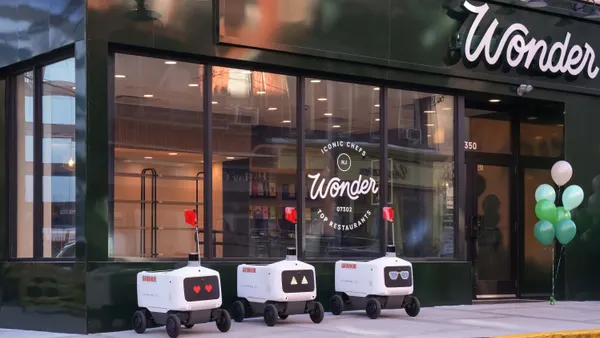Dive Brief:
- The coronavirus outbreak is hitting the casual dining segment particularly hard, as evidenced by Darden Restaurants' Q3 2020 earnings call. During that call, executives noted that same-store sales dropped almost 21% for the week ending March 15. During the week of March 16 through March 18, same-store sales were down 60%.
- As of Wednesday, 60% of its restaurants are mandated to to-go only, 16% have capacity constraints while 24% don't have any mandates. However, the company is reducing capacity by 50% to allow for social distancing, Rick Cardenas, Darden SVP and CFO, said during the call.
- In response to these sales trends, Darden has halted new construction, suspended quarterly dividends, reduced capital spending and withdrawn its financial guidance for 2020. CEO Gene Lee is also waiving his salary.
Dive Insight:
Earlier this week, S&P Global Market Intelligence reported that the 15 largest publicly-traded U.S. restaurants posted stock losses in the month ended March 16, with the S&P Composite 1500 Restaurants subindex falling 34.9%, and the S&P Composite 1500 index falling 30.1%. Darden's shares fell 59.6%, marking the steepest drop among these companies.
As the country's largest casual dining company, how this company performs during the pandemic is likely how the entire casual dining segment will go. Indeed, the casual dining concepts included in S&P data are all down by more than 40%, including The Cheesecake Factory (negative 58%), Cracker Barrel (negative 53%) and Texas Roadhouse (negative 41.6%).
Beyond the market, OpenTable's data reflects overall restaurant declines as well. Seated diners dropped by 91% as of March 18 in the U.S. and 89% globally from the same time last year, according to its data.
Casual dining faces a unique challenge in that a majority of its business is dine-in, which is a challenging model to maintain as Americans are given a social distancing directive to slow the spread of the virus.
Fast food is likely to be more insulated from the effects of this crisis, with a majority of the segment's business coming from minimal-contact, off-premise channels like drive-thru and takeout. Because of this, many such chains, including Starbucks, Chick-fil-A, KFC and McDonald's, have been able to shift to drive-thru/delivery/carryout-only models, and others, like Popeyes, are adding contactless delivery options.
While most casual dining brands have started to add and grow delivery, that percentage of that business remains small. In January, about 9% of sales come from DoorDash delivery at the Cheesecake Factory, for example, while that number is about 5% for Buffalo Wild Wings. These numbers aren't much different from fast food and fast casual (Chipotle is about 7% delivery), but casual concepts don't have the drive-thrus to fall back on in a time like this. During Darden's earnings call, Lee said he has been in contact with the administration and members of Congress to "help them understand the unique challenge we face in the full-service sector."
As a potential workaround, Darden has added a limited carryout menu and is offering limited or no-contact curbside pickup. In states where dining is still available, the company is "practicing social distancing in our seating configurations," Lee said.
Darden has been reluctant to partner with third-party delivery companies because of profit dilution and lack of customer connection, The Wall Street Journal reports. During Thursday's earnings call, however, the company was singing a slightly different tune, while also exploring the possibility of ramping up its own fleet.
"Everything is on the table," Lee said. "However, what we're focused on right now is ramping up and using our team members to be able to keep them on our payroll and develop our own delivery capabilities, which our teams are ramping very, very quickly."
Prior to the outbreak, Darden's off-premise business was growing about 20% versus last year. That number should continue to increase as the company changes its operating model to survive.










